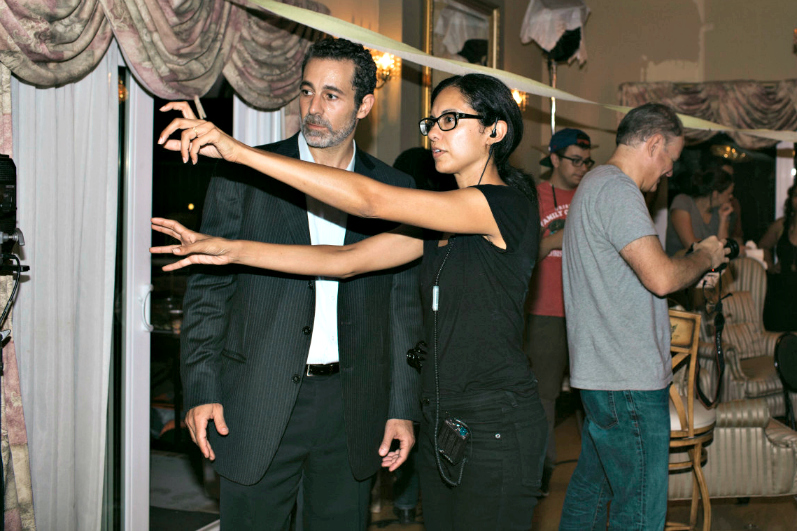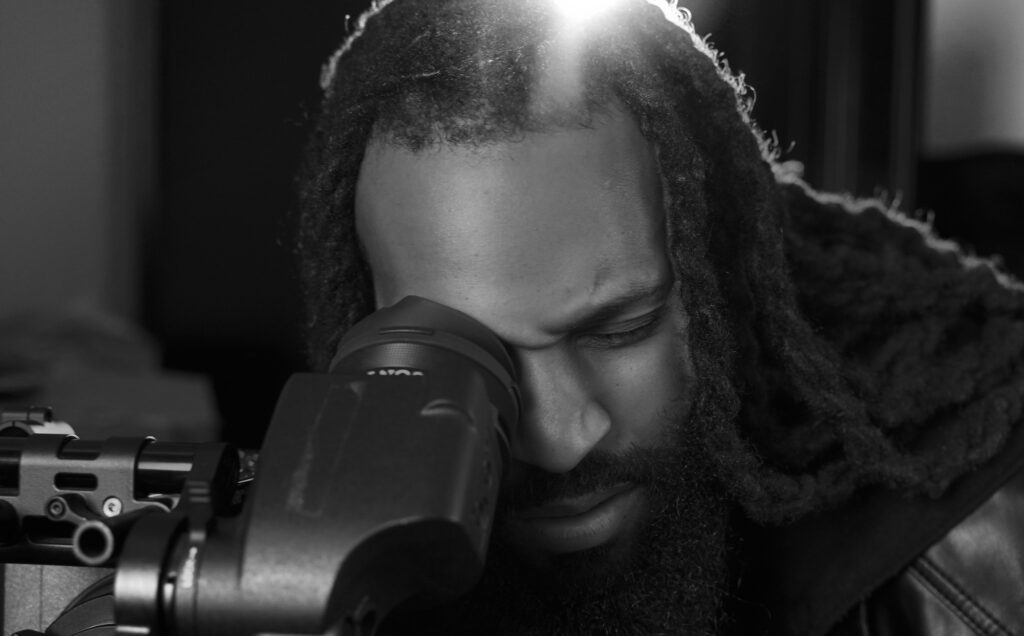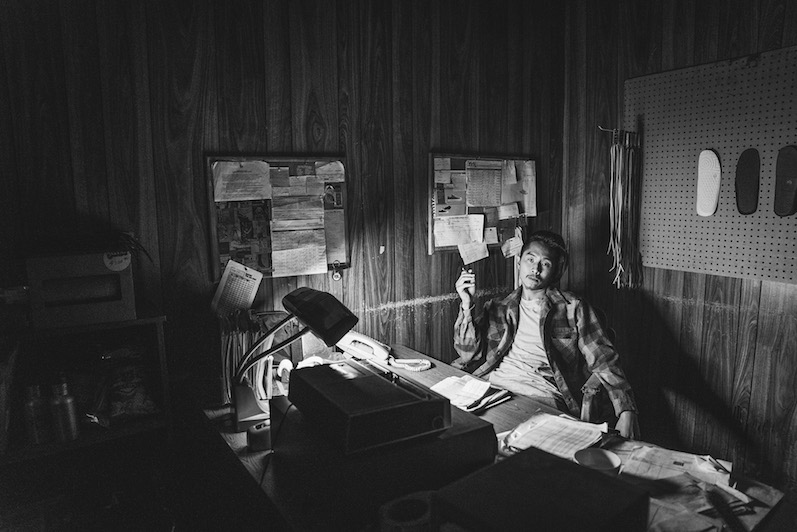Considering her background in journalism and public radio, it makes sense that filmmaker HEIDI SAMAN would tap into real-world issues even when making a work of fiction. Her short film The Maid (Il Shaghala) – which premiered at the 2008 Cannes Film Festival – focused on gender politics in Egypt. For her feature directorial debut NAMOUR, the filmmaker (and associate producer of NPR’s Fresh Air) looked back to recession-era 2008 Los Angeles to find the setting for her story about the American Dream in the twenty-first century.
Namour focuses on listless Egyptian-American Steven, played by Karim Saleh. Still living at home with his newly-divorced mother, Steven has a swanky valet parking job, a casual girlfriend he rarely sees, an estranged father, an ambitious younger sister, and a grandmother the family has unhappily moved into a convalescent home. When Steven’s mom announces her plans to sell the family house, Steven’s aimlessness starts giving way to a darker uncertainty about where his life is going. Namour co-stars Waleed Zuaiter, Nicole Haddad, Melina Lizette, and Mona Hala. The film premiered at the 2016 Los Angeles Film Festival, where Saman won the L.A. Muse Award.
ARRAY, the distribution collective founded by Ava DuVernay, has released Namour in select theaters in advance of its Netflix premiere on March 15. Screenwriter/director/producer Heidi Saman took some time out of her filmmaking (and radio producing) schedule to talk with us about her new film.
——
COLIN McCORMACK: I’d read an interview with you talking about meeting with potential investors and producers [for Namour]. And they had, shall we say, “interesting” suggestions for plots to introduce – including terrorism – because of the ethnicity of your characters. I was curious how you dealt with those kinds of suggestions in the room. Are you worried about burning bridges at that point or are you just sort of offended and want to get out as quickly as possible?
HEIDI SAMAN: You know, so much of this process for me has been about finding my colleagues and finding the right people for each project. I’m not a big confrontational person, but to me it just sent a message like, I don’t think this person wants to make the same thing I do. And frankly I don’t think the person believes in the same thing that I do. And these were producers from Arab backgrounds who were telling me this. It wasn’t just people who are not of Arab descent. I took it as a clue [laughs] that they might not be interested in the type of work I’m making, and maybe this is not a good partnership. But yeah, of course it’s hurtful to hear and I never liked hearing it. You have to regroup and go, “Wow, a lot of people [are] telling me this isn’t the kind of project they want to see. I want to see this, so what’s wrong with me?” Of course you have that moment. This film’s journey has been long, but it’s all been a part of trying to find the right people. And they’re out there, so I just had to stay strong and find them.
CM: You wrote a post for Mentorless about crowdfunding, and you talked about designating key “cheerleaders” to help mobilize support for your crowdfunding campaign. What types of people did you turn to to become cheerleaders for Namour?
HS: That’s a good question. I’m in my world – I’m a radio producer and I’m also a filmmaker – but I think what’s important for crowdfunding is to find those people that are outside of your immediate circles. So for me I had to go outside my arts world. Outside the people who are in radio production or who are in the world of radio. It would be approaching people in the medical field or the legal field, and that usually starts with your close friends or your family members. It was reaching out to those people because oftentimes it was those people who want to get involved in the arts but really don’t know how. Because it’s not their career, it’s not something that they do. So that was it, just try to find people who are interested in what you’re doing but maybe don’t have that access point to the arts. [People who] want to see it. They want you to work. They’re interested in it. It was family members, it was friends, it was digging deep; I had friends from my elementary school who gave money who I hadn’t heard from in years [laughs]. Those people became advocates too. It was great.
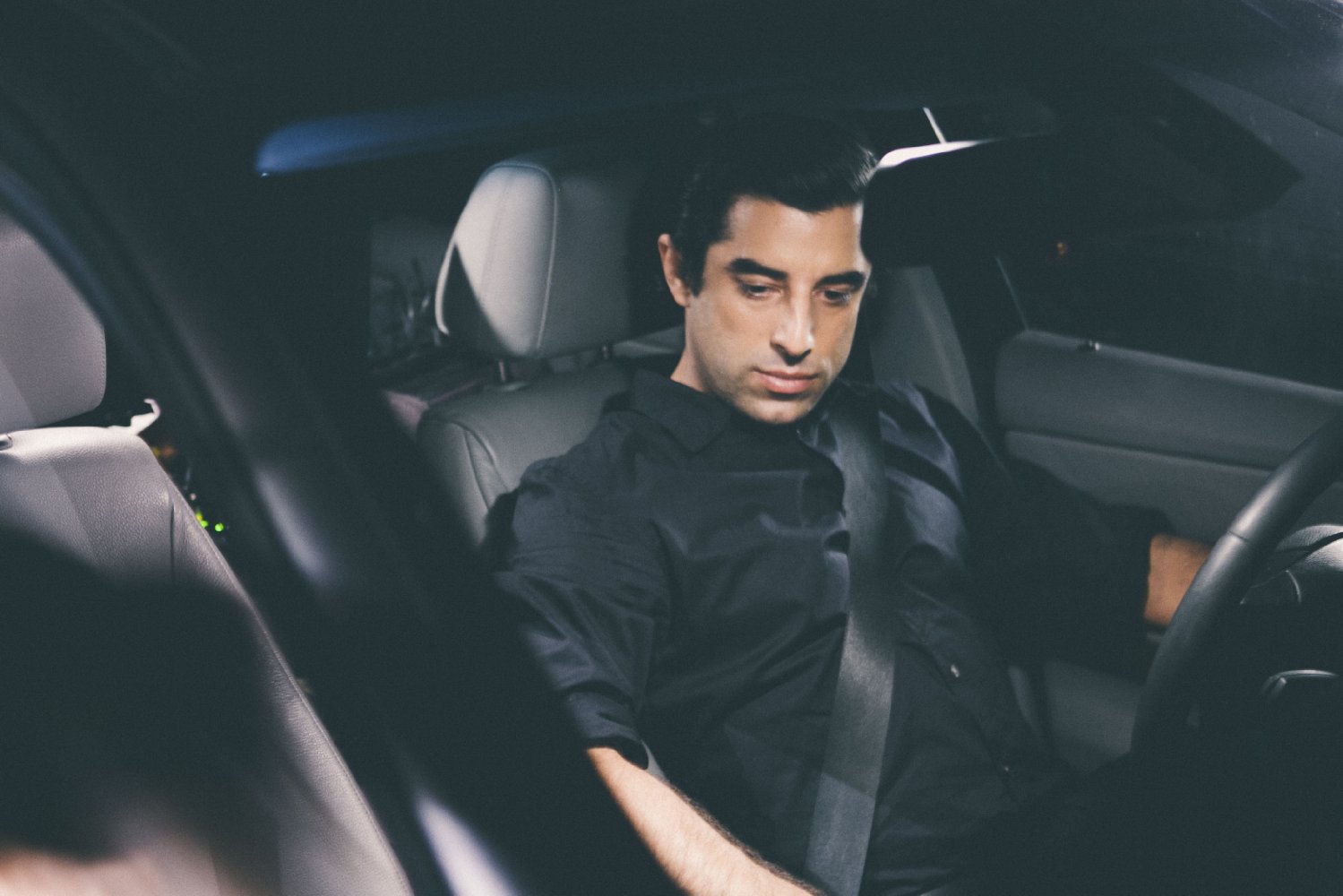
CM: The film was partly funded on grants as well?
HS: Absolutely. We used the [Arri] Alexa, the beautiful camera, and that was through the Panavision New Filmmaker Grant. So we got that. And then for post-production we were awarded a Knight Foundation Grant, which helped us get through post-production and a lot of the festival application process and everything that needed to get mailed out. And actually, I live in Philadelphia and I got a Leeway Grant for artists. It was $10,000 and it was I believe back in 2009. And I actually saved all of it! I bought a computer and I saved it because I was like, “I’m going to make a movie.” So I waited four years and I used that money [laughs]. And of course I took out some money to make the movie, my parents took out some money to make the movie, my brother helped me out. I paid everyone back, but it was a family affair.
CM: You keep up a pretty regular Tumblr blog about filmmaking. Is being accessible to the general public and also film fans handy when trying to build grassroots support for the film?
HS: I think so. I really think it’s helped so far. I’m curious to see what will happen as we put the film out there because Tumblr skews young and the people I follow and the people who follow me are really passionate about film. I believe in those circles a lot. I really think that they are passionate watchers. Even when I went to go speak at the University of Ohio, I mentioned it on my Tumblr and I had people reach out to me and say… “I’ve been following your Tumblr for a while and I go to college in Ohio.” I thought, “Oh my God!” I’m discovering the connections. I don’t have a huge Tumblr following, but I think because I post consistently and I’m reading everybody’s stuff that I follow, there’s definitely a good back-and-forth. So I’m curious to see what happens for people who have been following along on the film’s journey. When I did crowdsourcing they were involved; they were involved when it premiered at the LA Film Festival; they were involved when I announced it was going to be a part of Array. They’ve been great.
CM: Switching to casting, how did you go about finding your lead actors? Did you work with a casting director or did you know any of these actors prior?
HS: That’s a good question. My lead actor Karim Saleh I had seen in a film that had been banned in Lebanon [The Attack]; he had a supporting role. And I’d seen him in another film The Imperialists Are Still Alive! – an independent film – also in a supporting role. And I just had a feeling about him. I thought, This guy can do stuff. And sure enough, I was at a book event in Los Angeles and he was there. So I approached him and did that cheesy thing of, “Hi, I have a script. Will you read it?” And he did, and we ended up chatting later. So he was someone that I sought out. I also sought out Waleed Zuaiter, who plays the father. I’ve wanted him in my movies for a long time [laughs], and he finally said yes. For everybody else I did have a casting director, Sig de Miguel and Stephen Vincent. They were really the first people – they’re industry people – but they were the first people who really took me seriously and really read the script and helped me find the supporting roles. Because I wanted a world that felt like the diverse L.A. that I grew up in and I needed casting directors who understood that. And they did. They brought me such a great pool of people. To me it was just so important to have the supporting actors feel like L.A., and have that presence of just what L.A. felt like for me when I was living there and what it feels like now for my family living there. They just brought me the best of all of those international backgrounds. They got it [and] they helped me fill out the world of Namour.
CM: During auditions, was there a sense of palpable enthusiasm with a lot of the Arab-American actors? Coming in and having a chance for fully-formed, “normal” [characters] instead of the more stereotypical roles that I assume a lot actors of Arab descent are offered and auditioning for?
HS: Yes. It’s hard. It’s hard to see happen to a lot of [actors]. The pain these actors have had to deal with because they have this conflict of having to pay the bills and taking roles that are offered to them or taking roles that are right for them. And wanting to push through those artistic passions, those things that they know they’ve been trained to do [but] they’ve never been asked to do. Even people who were extras. We had one actor [Mike Batayeh], he wasn’t an extra, but his character has a violent end in Breaking Bad, and he plays a gentle Arab man in my film [laughs]. Someone like Karim, our lead actor, he can say no to a lot of things he doesn’t feel comfortable doing. But that’s not the case for a lot of the Arab actors who were in the film. They need to pay the bills so they’re going to take that “Terrorist #9” role. They have to live.
CM: In the film, Steven has some interesting encounters with the people that he’s parking cars for. Did you talk to valet drivers and get inspiration from peoples’ personal or oddest experiences on the job?
HS: Absolutely. I’m trained in journalism; I was a journalist before I decided I wanted to be a filmmaker. So that’s the journalistic part of the job, going out and talking to people. And a lot of people have done valet parking; it’s a good part-time gig. So yeah, there were several stories. I don’t know how much I can divulge, but several of the things that happen in the film are things that have happened to real people. Even when we screened the film I had people come up to me and say, “That was an experience I had.” “That was a thing I did.” There were a lot of real stories that I kind of had to edit down to put into the film. It’s an interesting space. The valet space in Los Angeles is a particular place where classes collide. I know there’s a Metro system there and more people are using it, but I think more consistently people still drive their cars. That’s the one space where you have someone else in your very intimate possession – your car. And they have to park it and deal with all of your belongings. I don’t know, I think that space is ripe for stories.
CM: It’s such an L.A. thing too. Valet everywhere.
HS: Yeah. [Laughs] I think you can valet to go hiking at this point.
CM: You shot your short film The Maid in Cairo. How does Los Angeles compare as a filming location to Egypt?
HS: Oh, it’s quite different. Egypt has such a well-established movie industry. I had an [Egyptian] producer there, but you still have to work through a lot of censors and a lot of bureaucracy. The risk-taking of filmmaking is the same everywhere, but the specifics of the obstacles can vary. I have a story in Cairo where we were going to shoot on the top of this building, a beautiful rooftop scene. And [my producer] comes up to me and says, “Someone in this building who is Muslim just passed away. So they’re going to be wailing.” The ceremony when someone dies in Islam is that they’re going to be wailing and crying for forty-eight hours. He just said, “I advise us to not do this.” [Laughs] We’re on their roof! So for religious reasons, for the customs, to be respectful, and obviously for our sound, we decided not to shoot there. You have those things happen in L.A. too, but culture-to-culture things vary. It may not be Muslims praying because someone has passed away, but it’s going to be the other things: Someone’s blocking the shot. We have to find another way to do this. Is there another time of day where we can do this? Also, the crew I took with me to Egypt, I wanted them to be very aware that Egyptians have a different way of doing things. In indie filmmaking in Egypt they still have a lot of people on set, which was a little confusing for us. We thought, Oh we’re an indie film crew, so why would you need eight people doing this [job]? But that’s how they do things there. That’s how they roll and I’m not going to change that. I don’t want to come in and change that, I want to be respectful of that and find a way to make it work with how we do things. So it was a learning curve for all of us.
CM: Since you’re a producer on Fresh Air with Terry Gross, are there any specific filmmaking-related guests or stories that have stuck out during your time there? She’s interviewed everyone from world leaders to actors and filmmakers. I’m curious about the filmmaking side.
HS: There’s been so many. [Pauses] Ugh, so many to list! I thought Alexander Payne when he spoke about directing, that was a very informative interview for me. Meryl Streep talking about acting was big for me. If I can be honest, we’ve had Ava DuVernay on the show and I found her to be so inspiring about what it’s like for people of color to make art films. That was huge for me. Other actors that we’ve had or other directors? I mean, it’s so funny, I work on the show every day and now I’m stumped [laughs]. There are so many people! Authors too. Anyone who can talk about the craft in what they do is always helpful for me. We had Mike Mills on for 20th Century Women, and I found that interview to be so wonderful. For any director, that’s an interview to listen to.
CM: Were you working at Fresh Air while you were prepping and making Namour?
HS: Correct. Yes, I was.
CM: Any advice for filmmakers who are juggling a day job with their passion project?
HS: It’s a hustle, get used to it. It’s so hard. Just find really cool bosses who understand that you have passions that you want to pursue. Most workplaces obviously give maternity leave, but most workplaces don’t give seven weeks off for someone to go shoot their film, and at Fresh Air that’s what my bosses did. I was very fortunate in that sense that they understood this was something I wanted to do, and it didn’t mean I wouldn’t come back and be a good producer. But yeah, it’s a hustle. So find kind people along the way [laughs].
CM: Array is an upstart distribution company; more of a “collective” is a word I’ve seen used for it. What’s it been like being embraced by this new company?
HS: I feel very fortunate. We’re their fifteenth film and we’re a part of a very special group of films. I feel like they just have great taste obviously [laughs], so I feel honored to be a part of that. It’s nice to know that films like this have a home. I feel very taken care of. They know what the film is, they know what it’s about, they know what we set out to do when we made the film. It fits. And I’m fortunate that I’m a filmmaker in this time with a distribution collective that understands the type of work that I’m doing. It’s been great.
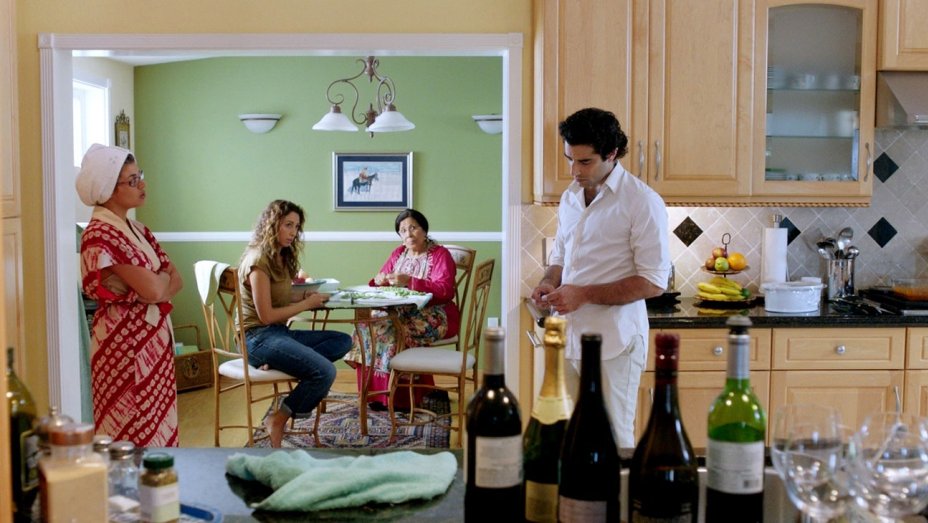
__
Thanks again to Heidi for talking to us about NAMOUR. Learn more about the film at namourthefilm.com or on Facebook and Instagram, or follow Heidi on Tumblr.
If you’re an independent filmmaker or know of an independent film-related topic we should write about, email blogadmin@sagindie.org for consideration.

